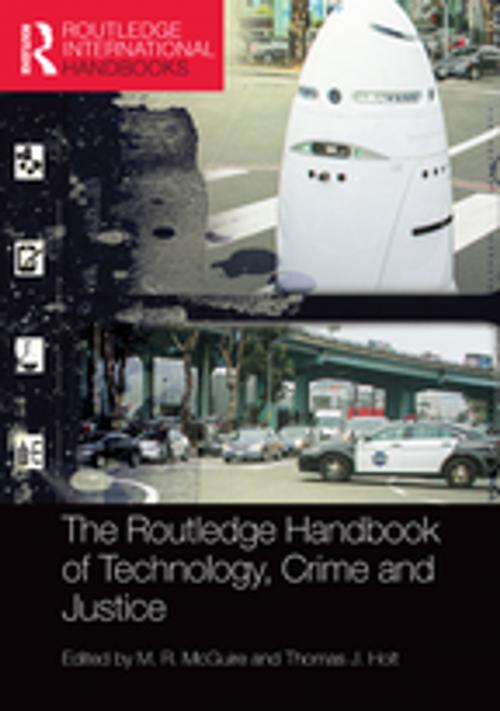The Routledge Handbook of Technology, Crime and Justice
Nonfiction, Social & Cultural Studies, Social Science, Crimes & Criminals, Criminology| Author: | ISBN: | 9781317590750 | |
| Publisher: | Taylor and Francis | Publication: | February 24, 2017 |
| Imprint: | Routledge | Language: | English |
| Author: | |
| ISBN: | 9781317590750 |
| Publisher: | Taylor and Francis |
| Publication: | February 24, 2017 |
| Imprint: | Routledge |
| Language: | English |
Technology has become increasingly important to both the function and our understanding of the justice process. Many forms of criminal behaviour are highly dependent upon technology, and crime control has become a predominantly technologically driven process – one where ‘traditional’ technological aids such as fingerprinting or blood sample analysis are supplemented by a dizzying array of tools and techniques including surveillance devices and DNA profiling.
This book offers the first comprehensive and holistic overview of global research on technology, crime and justice. It is divided into five parts, each corresponding with the key stages of the offending and justice process:
- Part I addresses the current conceptual understanding of technology within academia and the criminal justice system;
- Part II gives a comprehensive overview of the current relations between technology and criminal behaviour;
- Part III explores the current technologies within crime control and the ways in which technology underpins contemporary formal and informal social control;
- Part IV sets out some of the fundamental impacts technology is now having upon the judicial process;
- Part V reveals the emerging technologies for crime, control and justice and considers the extent to which new technology can be effectively regulated.
This landmark collection will be essential reading for academics, students and theorists within criminology, sociology, law, engineering and technology, and computer science, as well as practitioners and professionals working within and around the criminal justice system.
Technology has become increasingly important to both the function and our understanding of the justice process. Many forms of criminal behaviour are highly dependent upon technology, and crime control has become a predominantly technologically driven process – one where ‘traditional’ technological aids such as fingerprinting or blood sample analysis are supplemented by a dizzying array of tools and techniques including surveillance devices and DNA profiling.
This book offers the first comprehensive and holistic overview of global research on technology, crime and justice. It is divided into five parts, each corresponding with the key stages of the offending and justice process:
- Part I addresses the current conceptual understanding of technology within academia and the criminal justice system;
- Part II gives a comprehensive overview of the current relations between technology and criminal behaviour;
- Part III explores the current technologies within crime control and the ways in which technology underpins contemporary formal and informal social control;
- Part IV sets out some of the fundamental impacts technology is now having upon the judicial process;
- Part V reveals the emerging technologies for crime, control and justice and considers the extent to which new technology can be effectively regulated.
This landmark collection will be essential reading for academics, students and theorists within criminology, sociology, law, engineering and technology, and computer science, as well as practitioners and professionals working within and around the criminal justice system.















